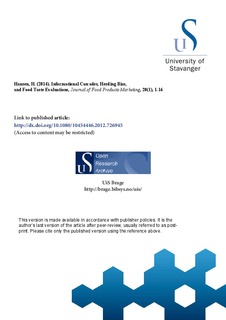Informational cascades, herding bias, and food taste evaluations
Journal article
Permanent lenke
http://hdl.handle.net/11250/2427559Utgivelsesdato
2013-12Metadata
Vis full innførselSamlinger
Originalversjon
Hansen, H. (2014). Informational Cascades, Herding Bias, and Food Taste Evaluations, Journal of Food Products Marketing, 20(1), 1-16 10.1080/10454446.2012.726945Sammendrag
Herding behavior is observed when consumers simply replicate the behavior of others instead of making their own elaborate decision. This study contains two experiments in which participants are asked to evaluate how good different food products taste under different conditions of induced herding situations. The results of the first experiment show that simply convincing consumers that a herd exists (i.e., informing them of the behavior of others) will influence their judgment of how good the food product in question tastes, and also their purchase intentions and belief in future product success. Whether they are informed about the existence of the herd before or after they taste the product also affects their evaluations. In the second experiment, the characteristics of the herd (who it consists of) are manipulated along with the country from where the food product originates. Here, the characteristics of the herd have significant effects on the evaluation of taste, purchase intentions, and expectations of future product success, whereas country-of-origin has no significant main effects. Theoretical and managerial implications are offered.
Beskrivelse
This is an Accepted Manuscript of an article published by Taylor & Francis in the Journal of Food Products Marketing on December 23, 2013, available online: http://www.tandfonline.com/doi/abs/10.1080/10454446.2012.726945.
